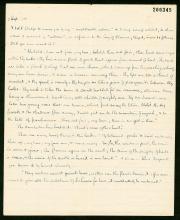BRACERS Record Detail for 19356
To access the original letter, email the Russell Archives.
"I told Gladys [Rinder] to assure you of my 'unalterable esteem' and I very nearly added, to show what I meant by 'esteem', a reference to the song of Solomon, chap 4, verses 1 and following."
There are two transcriptions with the last sentence of the penultimate paragraph omitted: document .052444, record 99918; document .201146, record 116375. These transcriptions also change "Gladys" to "Miss Rinder".
Letter 92
BR TO CONSTANCE MALLESON, 2 SEPT. 1918
BRACERS 19356. AL. McMaster
Previous Brixton letter, BRACERS 19355; next letter, BRACERS 19357
Edited by K. Blackwell, A. Bone, N. Griffin and S. Turcon
<Brixton Prison>1
2 Sep. ’18
I told Gladys to assure you of my “unalterable esteem” and I very nearly added, to show what I meant by “esteem”, a reference to the Song of Solomon,2 Chap 4, verses 1 and following. Did you ever read it?
“Behold, thou art fair, my love; behold thou art fair; thou hast dove’s eyes within thy locks: thy hair is as a flock of goats that appear from mount Gilead. Thy teeth are like a flock of sheep that are even shorn, which came up from the washing; whereof every one bear twins, and none is barren among them. Thy lips are like a thread of scarlet, and thy speech is comely: thy temples are like a piece of pomegranatea between thy locks. Thy neck is like the tower of David builded for an armoury, whereon there hang a thousand bucklers, all shields of mighty men. Thy two breasts are like two young roes that are twins, which feed among the lilies. Until the day break and the shadows flee away, I will get me to the mountain of myrrh, and to the hill of frankincense.b Thou art fair, my love; there is no spot in thee.”
The translators have headed it: “Christ’s care of the church.”3
There are many lovely things in this book: “My beloved spake and said unto me, Rise up, my love, my fair one, and come away. For, lo, the winter is past, the rain is over and gone; the flowers appear on the earth; the time of the singing of birds is come, and the voice of the turtle is heard in our land”4 and so on. But I expect you know it by heart already.
“Many waters cannot quench love, neither can the floods drown it: if a man would give all the substance of his house for love, it would utterly be contemned.”5
- 1
[document] The letter was edited from the unsigned, twice-folded sheet in BR’s hand in the Malleson papers in the Russell Archives. He wrote only on one side.
- 2
Song of Solomon BR quoted from the King James version, 4: 1–7. He misquoted “dove’s eyes” for “doves’ eyes”, and omitted “all” in the original’s “Thou art all fair”.
- 3
“Christ’s care of the church.” In two of the three Oxford University Press editions in Russell’s library, published in 1794 and 1883 (the latter, Granny Russell’s twelfth birthday gift to BR), this portion of the chapter summary, in italics, relates to Chapter 2, verse 14, which reads: “O my dove, that art in the clefts of the rock, in the secret places of the stairs, let me see thy countenance, let me hear thy voice; for sweet is thy voice, and thy countenance is comely.” In the third edition, published on India paper sometime in the twentieth century, the chapter summaries are omitted except for a few included in the running heads. “Christ’s care of the church” does not appear among them. However, in an 1837 Cambridge University Press edition, this chapter summary does appear in a running head for a page on which 4: 1–7 only just begins. In fact, this chapter summary is in the original King James edition (1611). Other editions may have treated the summaries similarly. It’s unknown what edition BR had in his cell, but he did relate “Christ’s care of the church” to the wrong chapter.
- 4
“My beloved spake … in our land” Song of Solomon 2: 10–12.
- 5
“Many waters cannot quench …contemned.” Song of Solomon 8: 7.

